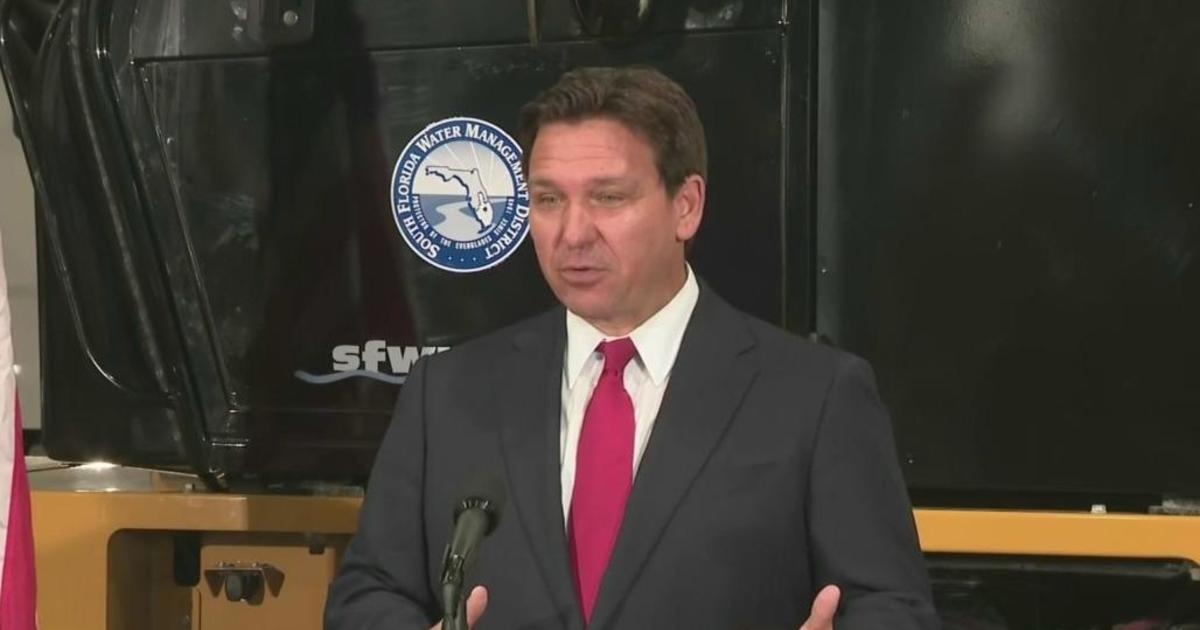Top Republican Leaders Reach Deal On State Budget
Follow CBSMIAMI.COM: Facebook | Twitter
TALLAHASSEE (CBSMiami/NSF) - With time running out to avoid a special session, legislative leaders agreed Thursday to the outlines of a nearly $83 billion budget and began negotiations aimed at hammering out details of the spending plan before a Tuesday deadline.
The deal will likely allow the session to end May 5th, as scheduled, avoiding the embarrassment for legislative Republicans of needing extra time for the second time in three years to complete lawmakers' only constitutionally required task.
"The reports of the demise of session have been greatly exaggerated," said House Speaker Richard Corcoran, R-Land O' Lakes, in a statement following the announcement.
But even as lawmakers celebrated, critics including Gov. Rick Scott were questioning the process that Corcoran and Senate President Joe Negron, R-Stuart, used to reach the agreement on "allocations." The deal sets out how much money should be spent on broad areas of the budget, like education or human services.
The late-breaking nature of the agreement, along with a couple of false starts and some comments by legislative leaders, seemed to indicate that Negron and Corcoran were getting beyond allocations and into the fine details of the plan in their closed-door negotiations.
Those smaller disagreements are usually smoothed over by joint House-Senate negotiating committees, which are open to the public and at least theoretically allow for more input by individual lawmakers. The committees began meeting Thursday evening after the deal was announced.
There was also speculation that Negron and Corcoran cut deals on policy issues and potentially other legislation during the discussions.
Even Scott, while lambasting the Legislature for spending less on tourism marketing and economic development than he had called for, took the unusual step of criticizing the process.
"I'd be furious if I was a House or Senate member," Scott told reporters. "Think about it, every one of them got elected in a district. They represent that district. They have the same number of votes as the speaker and Senate president. They should be in the discussion, just like the speaker and Senate president."
Negron and Corcoran --- who pledged to run the most open and transparent session in history --- defended their negotiations during a joint appearance Thursday afternoon, even as they refused to offer much detail on what had been agreed to.
"We've agreed that we would respect the priorities of the other chamber," Corcoran said.
After a contentious back-and-forth that lasted several minutes, Corcoran and Negron abruptly walked away from reporters who repeatedly asked for more specific information about the agreement.
To end the legislative session on time May 5, lawmakers need to finish the budget by Tuesday because of a constitutionally required 72-hour "cooling off" period.
Democrats largely held their fire on the process, for now, but warned that they would be on the lookout as negotiators start discussing the budget, the fine print known as "proviso," and related legislation.
"Now, as we move forward, if more issues start getting stuck in the budget, we start getting some of (this) stuff in proviso language and things like that, then, yeah, we'll have a problem with that," said Senate Minority Leader Oscar Braynon, D-Miami Gardens.
For his part, Senate Appropriations Chairman Jack Latvala, R-Clearwater, also pledged to be on the lookout for suspicious proviso.
"Anything that doesn't pass the smell test, I want to know about," he said.
One detail from the allocations agreement that emerged Thursday included an across-the-board pay raise for state employees, which Latvala and others said was the first in roughly a decade despite the fact that a salary increase was approved in 2013.
"For too long the men and women who have made Florida one of the premier places to raise a family, grow a business or enjoy retirement have done so without their hard work being justly compensated. No longer," said Andy Madtes, executive director of the American Federation of State, County and Municipal Employees in Florida.
In an apparent exchange, the Senate will consider a House proposal to require new state employees who don't select a retirement option within nine months to go into a 401(k)-style "investment plan." Those employees currently default into the traditional pension plan. The Senate won an extended time period for the selection --- up from six months --- and an exemption for law-enforcement and emergency workers.
Lawmakers had already revealed some of the overarching elements of the plan, but details continued to be filled in. The House won policy concessions on a $200 million plan to encourage charter schools where traditional public schools have struggled, and $200 million for teacher bonuses.
But Rep. Shevrin Jones, a West Park Democrat involved in education issues, said school districts would have more control over charters under the language than under the "schools of hope" plan that the House initially put forward.
Jones said the compromise might not assuage teachers unions and other groups, but satisfied him.
"The school district is in charge. ... We started somewhere which wasn't a happy medium, and I'm happy where we are now," Jones said.
But Rep. Manny Diaz Jr., the Hialeah Republican who chairs the House's public education budget subcommittee, said the specific language wasn't fully worked out yet. And he played down the notion that a school district might be able to bar charter operators from opening a "school of hope" in its area.
"I think there are some district options on the table," Diaz said.
Senate leaders have also floated the idea of using some of the House money for "wrap-around" services, like health care and after-school programs, at traditional public schools.
The House also prevailed on its insistence that education property tax bills not grow with property values, cutting back the amount of revenue that would be available for public schools. An initial House offer Thursday would bump up spending through the main education formula by about $24 a student --- or 0.34 percent --- more than the House's budget but far less than the Senate proposed.
That figure does not include funding for the "schools of hope" or the teacher bonus program.
The Senate, meanwhile, also received concessions from the House in the allocation deal, including agreements from the House on Negron's plan to build a reservoir south of Lake Okeechobee and his drive to funnel additional resources to universities.
The policy concessions the Senate has looked for on higher education include requiring universities to use block tuition by fall 2018 and creating a Board of Community Colleges to oversee the 28 state colleges.
"We're very pleased with where we are in higher ed," said Sen. Bill Galvano, a Bradenton Republican who chairs the Senate's higher education budget subcommittee.
The governor did not fare as well.
Scott would get just $25 million for Visit Florida, a tourism marketer, and operating funds for Enterprise Florida, an economic development agency. Scott had asked for as much as $100 million for Visit Florida and $85 million in incentives for Enterprise Florida.
In health care, the budget includes cuts to Medicaid funding for hospitals.
House Appropriations Chairman Carlos Trujillo, R-Miami, said money in the Low Income Pool program remains out of the budget until final details are negotiated with the federal government.
Scott announced recently that $1.5 billion would be available for the program, which provides additional money to hospitals that serve large numbers of poor and uninsured patients. But what are known as "terms and conditions" of how the money can be used is still being negotiated.
The News Service of Florida's Brandon Larrabee contributed to this report.



